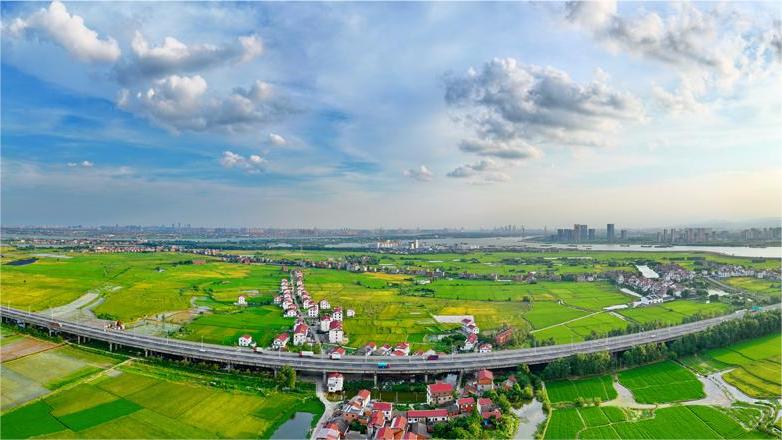Names extolling rosy life bear witness to Xinjiang's remarkable change

Children have fun in a cole flower field in Zhaosu County, Kazak Autonomous Prefecture of Ili, northwest China's Xinjiang Uygur Autonomous Region, July 17, 2023. (Xinhua/Zhao Ge)
URUMQI, July 22 (Xinhua) -- As the sun falls below the horizon and stars begin to sparkle amid the soothing moonlight, holiday-goers to the Kazak Autonomous Prefecture of Ili in Xinjiang, cannot help humming a melodious song "Night on the Prairie."
The classic Chinese folk was declared as a "world-famous oriental serenade" by UNESCO in 1990. The place mentioned in the lyrics is "Cocodala," which is a combination of the Kazakh and Mongolian term meaning "green fields."
This once obscure farm, which was rarely marked on maps, has transformed into a modern city with a population of approximately 200,000, thanks to rapid economic and social development. In 2015, the city was named Cocodala echoing its poetic charm and sublime scenery.
Long been a region where diverse ethnic cultures converge, Xinjiang's colorful ethnicity and advantaged landscape can also be reflected in the naming of its communities.
Urumqi, the regional capital, means "beautiful pasture" in Mongolian. Aksu, in southern Xinjiang, means "white water" in Uygur language. Throughout the long course of Xinjiang's historical development, these names serve as the most vivid cultural imprints and records of the region's transformation.
Gulchman Nuri, a resident of Cele County in the Hotan Prefecture, deeply sympathizes with such changes. She used to live on the southern edge of the Taklimakan Desert, China's largest desert known as the "Sea of Death," with no stable sources for food and income.
"In the past, we lived in dilapidated adobe houses. The land was severely desertified, making it impossible to grow crops, and there were no other sources of income. Our family earned less than 3,000 yuan (about 420.7 U.S. dollars) a year," she recalled.
A relocation project was put on the agenda of local authorities agenda to improve the livelihood of local residents. By moving to the flatland, locals can not only shake off poverty, but also have access to quality education, medical treatment and higher income.
But such a mega project is a tall order. China has been implementing "pairing assistance" programs in Xinjiang since 1997, channeling financial, technical and human resource support across various sectors from different regions of the country to the region.
Official data shows that the assisting provinces and cities had invested nearly 170 billion yuan in Xinjiang within a decade by 2023, with 80 percent of the funds spent on improving people's lives by providing them with access to safe housing, asphalt roads, tap water, and better education and medical services.
Gulchman Nuri's new home village was named Minhang, which means civil aviation, to show gratitude for the assistance from the national civil aviation administration's Xinjiang branch.
"The houses in our new village are neat and modern. The kindergarten and primary school are as good as those in the city. Life is so more convenient that we don't even have to leave the village to see a doctor," said Gulchman Nuri with a content smile.
Such stories can be found in many areas across Xinjiang, with the names serving as logs of its development. Ayzuhra Tursun, a resident in Shache County, expressed satisfaction with their current living conditions.
Their former life in Dmsi Township on the mountainside was often threatened by floods and rainstorms, and seeing a doctor was such a pain. Now, gone were these nightmares and they have embraced a brand new life with comfort and satisfaction.
"The name of our new village, Kangle, represents our current life, which literally means health and happiness," said Ayzuhra Tursun.
Photos
Related Stories
Copyright © 2024 People's Daily Online. All Rights Reserved.









